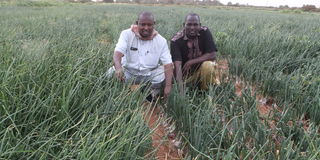New Mandera Kephis office to oversee cross-border seed flows

Mr Issack Mohamed Adan (left), an onion grower on his farm in Mandera on August 23, 2022. Kenya Plant Health Inspectorate Services (Kephis) is set to control plant seeds as local farmers rely on seeds from Yemen for onion growing.
What you need to know:
- Onion growers will be the most affected, as the Hargar mud onion variety they get from Yemen through Somalia will be vetted by the agency before it is allowed in Kenya.
- For years, onion growers have enjoyed a free supply of seeds that come with high yields and less crop husbandry.
- Mandera gets lots of seeds from outside Kenya and it was unclear whether they are certified.
The Kenya Plant Health Inspectorate Services (Kephis) will open an office in Mandera to control the free flow of seeds from neighbouring Somalia and Ethiopia.
Onion growers will be the most affected, as the Hargar mud onion variety they get from Yemen through Somalia will be vetted by the agency before it is allowed in Kenya.
For years, onion growers have enjoyed a free supply of seeds that come with high yields and less crop husbandry.
Mr Kattum Amos, from Kephis, said research has started on several plant seeds available in Mandera and that their findings and recommendations could affect onion farming in Mandera.
“We have just established an office in Mandera and this is because the border is set for reopening, which means we have now to start controlling the exports and imports of plant produce,” Mr Amos said.
Licenced seed dealers
Mandera, he said, gets lots of seeds from outside Kenya and it was unclear whether they are certified.
With a Kephis office, all seed dealers will have to be licensed and controlled.
“I understand there are onions and beans among other seeds that are found locally but once our office is functional, then we shall know which are the right seeds for the farmers in that county,” he said.
Kephis is a parastatal responsible for checking the quality of agricultural inputs and produce so as to prevent negative impacts on the economy, the environment and human health.
It was created under the Kenya Plant Health Inspectorate Service Act of 2012.
Its mission is to provide a science-based regulatory service by ensuring plant health, quality of agricultural inputs and produce for food security, globally competitive agriculture, and sustainable development.
Though Kephis will set up an office in Mandera, controlling plant seeds will have little impact on local farmers, said Mohamed Osman, a local agricultural officer.
“These seeds are certified from wherever they come from and local farmers have been impressed by them owing to their many advantages, including resistance to diseases,” he said.
Yemen-sourced onion seeds have a long shelf life and mature early, he said.
“The Hargar mud onion variety only takes up to three and half months before they mature, unlike the other varieties that take up to five months on the farm,” he added.
Disease-resistant
The other advantages of the Hagar variety are that they need little water on the farm, have big bulb sizes and are resistant to attacks from pests and diseases.
“The early maturity of this variety allows the farmer to have at least two seasons on the same piece of land in one year. We only just need to have this variety officially accepted in the country and onion growers will enjoy their efforts,” Mr Osman said.
Onions from Mandera are sold in Nairobi, Ethiopia and Somalia.
Mr Osman said it is the only Hargar variety adapted to the ecological conditions of Mandera county.
Mr Issack Mohamed Adan, an onion farmer, welcomed the Kephis plan but urged the agency not to ban the Yemen-sourced onion seeds.
Mr Adan said he has supplied several markets locally and “internationally” with onions from his farm for 19 years.
A venture that started on five acres has grown and Mr Adan will harvest onions on his 40-acre land in the second week of this month.
He said he struggled to fend off pests and diseases until he started growing the Hargar onion seeds from Yemen.
He expects to harvest at least 4,000 sacks of 60kg from his land after spending Sh960,000 on seeds.
He will make at least Sh13 million this season alone if sells a kilogram at Sh55 at local markets.





